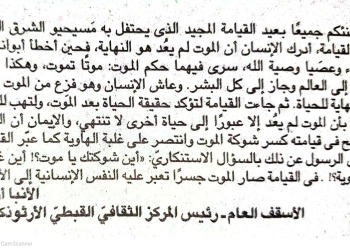Constitution is a mutual subject of interest for all Egyptians. It is the system of law and basic principles that the country is governed by to regulate the life of its citizens with dignity.
Definition of Constitution
Constitution is translated in Arabic as “Dostour” which is a word borrowed from Persian and consists of two syllables, the first means a rule and the second is maker and thus it means “Rule Maker”. The rule determines the system governing the country and whether it is a royal or republican. It also organizes the way that the general authorities deal with people and how they deal with one another, their rights, involving freedom of religion and thought, and duties. It is a framework of internal and externalissues. Any law or bylaw that does not follow the constitutional law is considered illegal.
History of Egyptian Constitutions
New constitutions are the outcome of any revolution. As the need to draft new constitutions, according to the principles of that revolution, arises. Egyptians people were always struggling to make a change, thus many constitutions were drafted up since dawn of history.
Egyptians constitutions were drafted up since 1825 along with the bylaw that was put by Muhammad Ali Pasha who also created a state of “law and order” in 1837.In 1866, a bylaw of establishing the Shura Council and its representatives was drafted and followed by the basic bylaw in 1882 concerning the election of House of Representatives. In 1882, the country’s constitution was drawn up, however English occupation resisted it. It was reissued in 1923 and followed by three royal orders that were issued concerning drafting a new constitution in 1930. The Constitution of 1930 was the constitution of Egypt from 1930 to 1935. It replaced the Constitution of 1923 until the Constitution of 1923 was restored in 1935 and was enacted till 1952.
In 1952, a constitutional declaration was promulgated and it considered constitution of 1923 null and void. A committee was formed to draft a new constitution and issued a declaration of a new constitution that included temporary constitutional principles in 1954 till a new constitution was drafted in 1956.In 1958 a temporary constitution was issued, yet was soon annulled and two were passed in 1962 concerning supreme state authorities. Egypt drafted another temporary constitution in 1964. The Permanent Constitution of Egypt was put into force after having been approved in a referendum in 1971.Few amendments took force in 1980, 2005 and 2007.
After the 25th revolution, the constitution was effectively voided as a new provisional constitution was passed by the Supreme Council of the Armed Forces. The new provisional constitution included the most recent amendments that were introduced on February 13, March 30, September 25, November 19 and the last was on June 17, 2012. In November 2012, a new provisional constitution was drafted until the Egyptian president came to power followed by a new constitution. The Constitution had been in effect only six months, when the June 2013 Revolution broke out. It was then suspended and a committee was formed to amend it.
In 2013, the controversial articles of the 2012 Constitution, that was suspended, were amended. A referendum on the new constitution was held on January 14-15.
The preface of 2014 constitution included the following:
-
Egypt is the gift of the Nile to Egyptians and the gift of Egyptians to humanity. With its unique location and history, Egypt is the Arab heart of the world. It is the meeting point of world civilizations and cultures and the crossroads of its maritime transportation and communications.
-
Egypt is the cradle of belief. On its land, Prophet Moses – to whom Allah spoke – grew up and on Mount Sinai, the Revelation of Allah shone on his heart and Divine message descended. On its land, Egyptians harbored in their bosoms Virgin Mary and her baby and offered thousands of martyrs in defense of the Christian church.
-
Egyptians made sacrifices in several uprisings and revolutions until our patriotic army stood up for the overwhelming will of the people in the “Jan 25 – June 30” revolution that called for freedom, human dignity and social justice for all, and for Egypt to regain its independent will. Compared to major revolutions in the history of mankind, the Jan 25 – June 30 Revolution is unique with its high density of popular participation. This Revolution is further unique because of its peacefulness and ambition to achieve freedom and social justice combined.
-
We are now drafting a Constitution that embodies the dream of generations for a prosperous consolidated society and a just state. We believe in democracy as a path, a future, and mode of living, political pluralism and the peaceful rotation of power. We affirm the right of the people to make and determine their future. The Egyptian people, is the sole source of authority.






